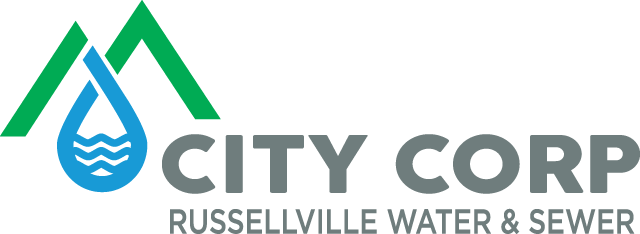Wastewater Treatment
The Pollution Control Works facility provides wastewater treatment for Russellville’s 30,000 residents, local industry and the city of Dover. With a design flow of 8.5 million gallons a day, the PCW is an activated sludge plant utilizing both physical and biological processes to significantly reduce the pollutants in the wastewater. Constructed in 1964, the plant has undergone numerous upgrades and modifications to keep up with a growing population, the most recent being completed at the end of 2022. The $15,000,000 upgrade project included grit removal rehab, an anaerobic selector, an additional aeration basin, aeration blower capacity expansion, and a peracetic acid contact basin for disinfection. The PCW produces Class A – EQ biosolids, which meet the EPA’s most stringent limits, and are used by the public as a soil conditioner.
Pretreatment
The pretreatment coordinator is responsible for overseeing City Corporation’s pretreatment program, required under 40 CFR 403 of the Clean Water Act, which provides the regulatory basis to require non-domestic dischargers to comply with applicable pretreatment standards. The objectives of the pretreatment program are to prevent pollutants from industrial and commercial facilities, that are incompatible with the wastewater treatment plant. If you have any questions about our pretreatment program, please contact our pretreatment coordinator using the contact link below.
Collection System
The Russellville wastewater collections system consists of approximately 170 miles of publicly maintained gravity sewer ranging in size from 6″ to 36″ in diameter, approximately 3291 manholes, 19 lift stations of various pumping capacities and 14.1 miles of force main ranging in size from 2″ through 48″ in diameter. Approximately 9,000 homes and businesses, and the service lines connecting these homes and businesses constitute an additional 129 miles of sewers, predominantly 4″ in diameter. (This figure does not include the Dover sewers.) The predominate material for the gravity sewer lines was vitrified clay, with masonry manholes prior to 1970. Beginning in approximately 1970, ABS truss pipe began to be used as an alternative to vitrified clay. Beginning in approximately 1980, SDR 26 PVC with monolithically poured concrete manholes began to be the predominate collection system material. Older service lines are vitrified clay with limited substitution of “Orangeburg” fiber tube. Present day service line installations are constructed of solvent welded schedule 40 PVC pipe.
The Russellville wastewater system includes 19 lift stations that serve various parts of the City. The system treats all of Dover sanitary sewer. However, statistics for the Dover, Arkansas collection basin are not included.
Laboratory
The City Corporation Wastewater Laboratory is located at the Pollution Control Works Facility. Laboratory Analysts are responsible for routine monitoring and regulatory compliance. A lab analyst is on call at all times to collect necessary system samples.
